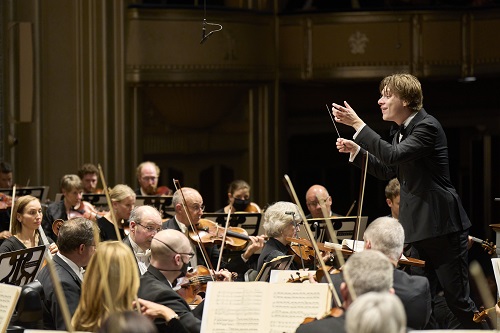 United States Norman, Debussy, Ravel: Cleveland Orchestra / Klaus Mäkelä (conductor). Mandel Concert Hall at Severance Music Center, Cleveland, 2.2.2023. (MSJ)
United States Norman, Debussy, Ravel: Cleveland Orchestra / Klaus Mäkelä (conductor). Mandel Concert Hall at Severance Music Center, Cleveland, 2.2.2023. (MSJ)

Andrew Norman – Sustain
Debussy – Images
Ravel – Boléro
Last season, Klaus Mäkelä was impressive leading the Cleveland Orchestra in Shostakovich’s Tenth. Since then, the young Finnish conductor seems to have been everywhere, releasing a Sibelius cycle on Decca with the Oslo Philharmonic and being named future music director of the Concertgebouw Orchestra in Amsterdam (a position that starts in 2027).
For the first of his two weekends here, a concert had been planned that would have included the Cleveland debut of Esa-Pekka Salonen’s Cello Concerto with Truls Mørk. Unfortunately, Mørk suffered an arm injury and was forced to cancel. Instead of slotting in another soloist with a more familiar work, the orchestra gave Mäkelä an unusual gift and allowed him to pick an orchestral work to replace the concerto.
Mäkelä made the most of this opportunity and chose Andrew Norman’s Sustain, written for Gustavo Dudamel and the Los Angeles Philharmonic in 2018. Sustain is remarkable despite the heavy-handed, environmentalist title. The work is far better than such hectoring promises, and the effect isn’t easy to capture in words. It starts with pan-tonal sweeps of sound through the strings, gradually shifting to winds, then to brass as the density grows. Clearly a piece of its time, it doesn’t go out of the way to be confrontationally dissonant, though that does organically happen in places. But the slow drift of the music feels downright futuristic, suggesting an evocation of galactic scales. Think of something like John Luther Adams’s Become Ocean, only more cosmic. These sweeps of sound evoke gravity waves rippling across the local cluster of galaxies, with little fractal spins happening in places where black holes draw in matter.
That would be remarkable enough and would, in its own right, make for a good fifteen-minute piece. But Norman then takes the chunk of music and repeats it (with some different details) three times faster. Then he repeats several more times, constantly faster, until the big crunch of the piece is like stars being ripped apart. It floats into a strange and beautiful coda capped with the strings miming their final notes. This is transporting, riveting, brilliant music, and the orchestra relished the considerable challenges. Mäkelä was at his absolute best, guiding the complicated music with certainty and utter commitment, and the audience received the piece warmly. The only thing that could have improved the experience would have been to have heard it as the final item on the program.
As it was, listeners had to climb back down to the earthly plane after the intermission for the second half, devoted to Debussy’s Images and Ravel’s Boléro. After the demands of the 35-minute Norman piece, this was a hefty follow-up, but the orchestra was up to it throughout the Debussy. Mäkelä’s approach emphasized supple color, particularly during the rousing ‘Ibéria’. I admit a preference for performances that move the ‘Rondes des Printemps’ into the middle spot and close with the more exciting ‘Ibéria’, but Mäkelä stuck with the score. The orchestra offered both brilliance and nuance, making for a richly satisfying performance.
That resulted in a mostly great concert. The Ravel Boléro that followed wasn’t bad, though it wasn’t very good, either. The piece has traditionally been played faster than the composer wanted it. Now, that says a lot about the world, which wants it to be a fun and sexy piece of music, but what Ravel wrote was a slow-burn experiment in aggravating madness. Ravel made a recording himself that paced the work around sixteen-and-a-half minutes, slower than the fourteen- or fifteen-minute rate commonly heard. When a friend expressed surprise at the slow tempo, Ravel is reported to have remarked that if he thought the orchestra could do it, he would have taken it more slowly.
Mighty – and terrifying – performances at slow speeds take tremendous orchestral skill and great care from the conductor. The Cleveland Orchestra would be eminently capable of such a slow burn, but Mäkelä wasn’t interested in that, turning in a middle-of-the-road pace. Also, in a work requiring clockwork precision, the conductor put down his baton and led with his bare hands. That worked well enough for the early stages of the piece, when he encouraged the soloists to take ownership of their moments, which the players did and very attractively. As the piece built, though, Mäkelä’s gestures grew ragged and flashy, not always coming in tempo. The orchestra kept the piece on the rails, but there were some uncertain rhythms in places. Near the end, the conductor had been devoting so much of his attention to the strings, he seemed surprised to turn and find that the trumpet section had entered despite the lack of a cue from the podium. After the intensity of the Norman piece, the peak of Boléro was anticlimactic.
Perhaps Mäkelä was too tired after such a demanding concert to bring the level of intensity Ravel desired, or perhaps he just regards it as a lightweight pops piece (which it isn’t). Whatever the case, both Ravel and the Cleveland Orchestra require more than ragged flash, unless that is made the overarching esthetic of the performance, which it didn’t appear to be here. But it was a weak spot in what was otherwise a fine concert. It will be extremely interesting to see what Mäkelä does with Mahler’s Fifth next weekend.
Mark Sebastian Jordan
Apparently Mäkelä was ill and had to be replaced for the three following dates? I can’t seem to find much online about this or who replaced him, so any further information would be appreciated. In any case this could help explain a lackluster Boléro.
Daniel Reith, the Assistant Conductor replaced Mäkelä on the Sunday concert, and I assume the other two.